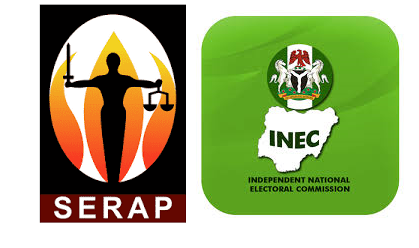
SERAP Demands Action Over Early Election Campaigns; INEC Cites Legal Limitations
Lagos / Abuja (September 14, 2025)
The Socio-Economic Rights and Accountability Project (SERAP) has intensified pressure on the Independent National Electoral Commission (INEC), demanding that the body enforce existing laws and punish political parties or politicians who are running early campaigns, an activity SERAP argues undermines Nigeria’s electoral integrity. The demands come after INEC recently raised concerns that early campaigning by politicians and aspirants has made it difficult for the commission to monitor campaign finance and has created unfair advantages for candidates who begin political activity ahead of the legally prescribed timeline.
SERAP’s letter to INEC, signed by deputy director Kolawole Oluwadare (dated 13 September 2025), explicitly labels early election campaigns as both unconstitutional and illegal. The letter asserts that INEC already has constitutional and statutory mandates (including under the Electoral Act) to sanction electoral offenses, and calls on INEC to identify offending parties, monitor their breaches, publish regulations governing campaign conduct, and, crucially, prosecute offenders and their sponsors. SERAP sets a seven-day ultimatum for INEC to respond meaningfully, or face legal action.
In reply, INEC has acknowledged the reality of premature campaigning and expressed concern that it weakens the capacity to enforce campaign finance limits. However, the commission has also stated that there are legal gaps—specifically, that the law currently does not provide adequate sanctions for activities that fall outside the campaign period, before the 150-day window established ahead of the 2027 general elections.
“In the law, the campaign period is clearly defined: the 150 days before polling day is when formal campaigns should begin,” INEC Chair Prof. Mahmood Yakubu said during a policy roundtable. The commission argues that many campaign-like activities—billboards, media appearances, rallies—are happening well before this window, but because the law does not (yet) impose penalties for those early actions, INEC claims it is constrained in what it can do.
Still, civil society, including SERAP, disagrees that these constraints are insurmountable. They point to sections of the Electoral Act and Nigerian Constitution (such as Section 83 and related provisions) that they believe provide INEC with legal instruments to compel compliance and punish violations.
SERAP and other observers argue that early campaigns damage governance, fairness, and development. Some of the consequences cited include:
Economic costs: Extended campaigns drain public attention and resources, distract government from service delivery, and foster “prolonged electioneering frenzy.”
Unequal playing field: Well-funded incumbents or powerful governors are able to act earlier, gaining visibility and influence while others restricted by resources or principled waiting are disadvantaged.
Erosion of democratic norms & trust: Persistent early campaigning, especially when left unpunished, may breed impunity, encourage corruption in campaign financing, and reduce public confidence in the commitment to free and fair elections.
SERAP has given INEC a seven-day deadline to identify offenders, publish regulations, and start prosecuting violators. If INEC fails, SERAP indicates it will take legal steps.
INEC and others (including former INEC chair Attahiru Jega) are calling for legislative reform, specifically to close loopholes in the Electoral Act that allow early campaigns to go unchecked.
INEC’s constraints are real but debated: While INEC observes legal gaps—especially in penalties for pre-campaign activities—SERAP and civil society believe there are existing legal frameworks (Electoral Act, parts of the Constitution) that if properly applied, could cover many of the questionable actions. The debate is less about whether the problem exists, and more about how far INEC is willing to use its mandate.
The political stakes are high: Early campaign advantage, particularly by governors with large budgets, raises fairness concerns. If incumbent or powerful actors can mobilize early, set narratives, deploy banners, adverts, and other campaign tools well before others, the competition is skewed even before the race formally begins.
Momentum for reform: The combined voices of SERAP, INEC, former INEC officials, and media reports suggest that public pressure for clearer laws, stronger enforcement, and institutional accountability is mounting. The legal architecture for elections may undergo substantive scrutiny ahead of 2027.
SERAP’s demand comes at a critical juncture: Nigeria stands less than two years from its next general election, and tensions around fairness, influence, and integrity are already surfacing. By challenging INEC to act now—identifying offenders, enforcing existing laws, and pushing for reforms—SERAP places the burden of accountability squarely on Nigeria’s electoral institutions.